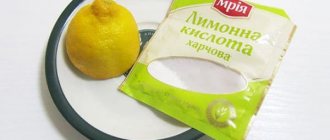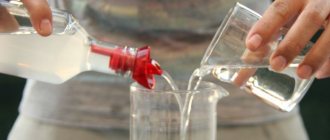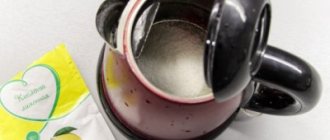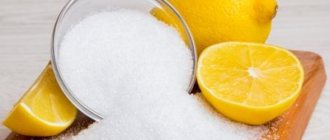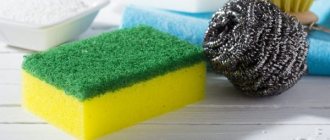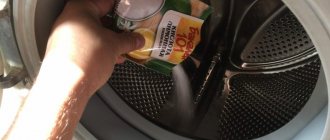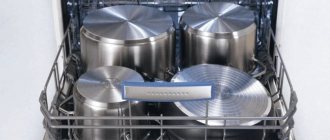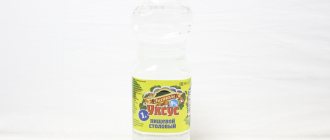Quite often in culinary recipes there is an instruction to “sprinkle the dish (mainly salads) with lemon juice.” Citrus fruits are generously added to baked goods. Sour lemon juice makes it less cloying. Citrons are added to both dough and creams. They use both the zest of the exotic fruit and candied pieces of pulp and skin. But most often the ingredient in dishes is lemon juice. It is added both to soups (for example, solyanka) and to drinks - tea, alcoholic and refreshing cocktails. This article is devoted to one question: is it possible to replace lemon juice with citric acid? And if so, how to introduce white crystals into a dish? What are the proportions? What needs to be done to make the dish taste as if it contained natural lemon juice? You will read about this below.
How often to wash?
The frequency of cleaning the oven depends on the frequency of its use.
It is recommended to clean the surfaces every time after cooking in the oven. In this case, no persistent contaminants are formed in it.
You can treat the walls by wiping them with a weak solution of citric acid or water and dishwashing detergent.
It should be noted that general processing will still have to be carried out at least once every 3 to 6 months.
Application technology
There are several ways to clean your oven using lemon and powder cleaner. The advisability of their use depends on the degree of contamination of the cabinet surfaces, as well as how fresh or old they are.
Fresh grease stains are easy to deal with. As for old soot and greasy deposits, in this case it will be necessary to carry out thorough treatment with the inclusion of auxiliary components, heating and repeating the procedure.
Cleaning the oven with lemon
To clean the oven, a minimum amount of cheap components is enough. However, the effect of their use exceeds the effect of expensive household chemicals.
For the procedure you will need the following ingredients and available tools:
- 2 bags (20 g each) of citric acid;
- 0.5 liters of warm water;
- foam sponge;
- rags or fabric napkins;
- heat-resistant dishes.
Be sure to wear thick rubber gloves while working. Under no circumstances should you use a knife or other sharp objects to clean carbon deposits and grease from the oven surfaces.
Before starting the procedure, remove the baking sheets and racks from the oven. They are cleaned separately. After that:
Preheat the oven to 180°C.- Prepare a water-soda solution by thoroughly stirring the soda until completely dissolved.
- Pour the resulting mixture into a baking tray or heat-resistant container.
- After turning off the oven, place the bowl with the soda solution on the bottom of the oven.
- Close the door tightly for half an hour or more until the temperature of the working solution and the surfaces to be treated is suitable for safely cleaning the oven.
- Remove the container with the solution.
- Start cleaning the walls with less contaminated areas.
- Stains that cannot be cleaned can be additionally rubbed with lemon pulp or juice. After 3-5 minutes, wipe them with a sponge.
- At the end of the manipulations, it is necessary to wipe the surfaces with a damp cloth, then with a dry cloth.
For minor contamination, you can simply wipe the internal parts of the oven with a warm water-soda solution without resorting to steam treatment.
Another easy way to clean the oven is to spray the working solution from a spray bottle and then remove grease stains. Be sure to leave the door open for 3 to 4 hours to ventilate the oven.
How to clean with citrus juice?
Cleaning the entire oven with fresh fruit is irrational. It will take at least 4 - 5 lemons to treat all surfaces. It is wiser to use dry powder.
To remove small fresh stains, it is enough to:
- juice of one lemon;
- the same amount of warm water;
- sprayer.
Progress:
Squeeze out the juice and mix with an equal amount of water.- Fill a spray bottle with the mixture.
- Apply the mixture to the inner walls, top and bottom of the oven.
- Close the oven and keep it closed for at least 1 hour.
- Wipe all surfaces with a sponge, removing grease, then wipe with a damp cloth soaked in water. The final touch is to wipe dry with a rag.
If you find small greasy stains, rub them with the pulp of a squeezed lemon. After 5 min. Remove the stain by lightly pressing the sponge. Don't forget to ventilate the oven after processing.
What can I add?
The need to include other ingredients when cleaning the oven with citric acid arises if the internal surfaces are covered with a thick and old layer of fat and carbon deposits. In this case, a paste-like mixture is prepared from several components.
Namely:
- 30 g citric acid;
- 1 tbsp. l. baking soda;
- 100 ml. table vinegar;
- warm soapy solution.
Step by step steps:
- Turn on the oven and preheat to 100°C.
- After turning off, leave for a quarter of an hour so that the carbon and fat soften under the influence of heat.
- During this time, prepare a paste-like mass by combining citric acid crystals with soda and vinegar in a deep bowl. It is important to combine the dry ingredients first and then gradually add the table vinegar, as adding it will start a reaction.
- Generously lubricate the internal surfaces with the resulting mixture, leaving it on them for 15 - 20 minutes.
- After this time, wipe the surfaces with a soft sponge to remove dirt.
- The surfaces should then be washed with warm soapy water. It is advisable to use laundry soap.
- Rinse off the soap solution with clean water.
- Wipe dry with a clean cloth.
Do not use hard sponges or scrapers for cleaning. This may damage the enamel coating of the oven walls.
Cooking process
First, you need to measure out one teaspoon of citric acid powder. Then pour it into a clean, dry cup. The container should be made of glass or porcelain. The acid may react with the metal. For example, aluminum itself will darken, and the juice will turn into a dark, unpleasant color.
Now warm purified water is added to the mug, preferably boiled. There should be exactly twice as much water as acid. Of course, you can use cold water, but then the acid will take longer to dissolve. You will have to wait about seven minutes, but do not forget to stir the solution. But if the water is warm enough, the juice will be ready instantly.
Many housewives are wondering how to make lemon juice from citric acid for a cake. Answer: the same. The proportions are always the same if you need juice. It’s the same here whether for confectionery or for salads. It’s another matter if you need not juice, but a solution. There may be many options here. Some of them have been listed above.
Of course, you should never rinse your hair with artificial lemon juice. There is a risk of burning not only the skin, but also damaging the eyes. A much weaker solution is needed here.
With citric acid, although it is considered food grade, you need to be extremely careful. After all, it is an acid. You should not drink artificial lemon juice. It can only be used in small quantities during cooking.
The lemon bottle should not be placed on an open surface if there are children in the house. After all, if you taste it with the tip of your tongue, it may seem very tasty. But in large quantities it can cause enormous harm to the child’s body.
How to choose lemon for tea
High-quality citrus fruit is the key to delicious tea. Lemon should be selected by following these simple points:
- there should be no dark spots or dots on the surface of the fruit;
- its skin should not have concavities or rotten parts;
- it is necessary that the citrus smell of the fruit be felt through its peel (the absence of a characteristic aroma may indicate the use of excessive amounts of chemicals during cultivation);
- You should choose for tea a ripe lemon with elastic yellow skin;
- by placing the fruit on a napkin, you can see stains from essential oils on it - this indicates that no chemical treatment was carried out on the fruit itself;
- there is no need to buy lemons that have an overly shiny surface (the shine of the peel indicates that the fruit has been treated with reagents, for example, paraffin);
- It is better to choose citrus, which is characterized by thin and smooth skin, because It is believed that such fruits are the most beneficial for the human body.
Most often, the wrong lemon gives the drink an unpleasant bitter taste, so to avoid this, buy high-quality fruits.
Benefits of citric acid
Synthetic powder is widely used in the food industry and is labeled as E330-E333. But is this flavoring additive completely safe? Is it possible to replace lemon juice with citric acid without harm to the body? The powder is used in the food industry, not only to improve the taste of the product. Citric acid prevents the development of microorganisms, the appearance of mold and unpleasant odors. Therefore, E330 is also used as a preservative. Despite the fact that citric acid is no longer extracted from fruits, it, like citrus fruits, improves vision, strengthens the immune system and has a positive effect on the digestive system. Since it speeds up metabolism, it is used in diets to reduce excess weight. This substance removes toxins, waste, and harmful salts from the body.
Is it possible to replace lemon juice with citric acid?
Subtropical fruits cannot be called cheap. And most recipes only require a couple of drops or a teaspoon of lemon juice. The rest sits in the refrigerator for a long time, dries and withers. Whereas citric acid in a bag can be stored for years. And it costs mere pennies. Therefore, experienced housewives, when asked whether citric acid will replace lemon juice, usually answer: “Yes! And vinegar too! It can also be used to wash metal surfaces contaminated with limescale and rust.”
As for cooking, the range of dishes in which you can use both citrus juice and citric acid is quite wide. If you are kneading dough, you can mix a small amount of synthetic powder with flour. In other cases, the acid crystals must be dissolved in warm water until the concentration of regular lemon juice is reached. The proportions are like this. A small pinch (some recipes recommend on the tip of a knife) per fifty milliliters of warm water. The solution should be cooled.
How to dilute vinegar essence? (to get vinegar)
How to dilute vinegar from 70% vinegar essence:
9% vinegar, you need to take one part of the essence and add seven parts of water (1 tablespoon of essence and 7 tablespoons of water)
6% vinegar - add 11 parts of water to one part of essence (1 tablespoon of essence and 11 tablespoons of water)
5% vinegar - add 13 parts water to one part essence (1 tablespoon essence and 13 tablespoons water)
4% vinegar - add 17 parts of water to one part of essence (1 tablespoon of essence and 17 tablespoons of water)
3% vinegar - add 23 parts water to one part essence (1 tablespoon essence and 23 tablespoons water)
So, if you need 1 tablespoon of 70% vinegar essence, but you only have 5% vinegar, and its concentration is 13 times less, then you need to add 13 tablespoons of 5% vinegar.
Another point to consider is that if the recipe says 1 tablespoon of vinegar essence 70%, and you replace the essence with vinegar in the required proportion, then take not 1 liter of water, but several tablespoons less. That is, 5% vinegar 7 tablespoons and MINUS 13 tablespoons of water.
If you need to add 1 tablespoon of 70% vinegar essence, and you only have 9% vinegar, then you need to add 7 tablespoons of 9% vinegar.
Some nuances of drinking tea with lemon
It is believed that vitamin C can be destroyed under the influence of boiling water - a controversial issue, but it is still better to put citrus in slightly cooled tea. For those who like hot drinks, it is recommended to drink lemon when drinking tea.
It is most beneficial to drink tea with lemon slices (the zest contains many valuable components), rather than adding juice to the drink. A healthy person can drink tea with lemon every day, but it is better to limit it to 1-2 cups: no health problems will result from such tea drinking.
Harm of citric acid
Not all people can tolerate citrus fruits. These fruits can cause an allergic reaction. Likewise, citric acid is unacceptable to some people. It should be used with caution by patients with gastritis and stomach ulcers. But we wondered: can citric acid replace lemon juice? The time has come to answer it. Yes maybe. But in the case of powder, care must be taken not to make the solution too concentrated. After all, then this can lead to discomfort in the stomach, heartburn, colic and vomiting. Undissolved powder should not be eaten as it causes burns to the mucous membranes.
Table vinegar (9%) can be replaced with apple cider vinegar.
But you need to understand that apple cider vinegar is sold at 5%, that is, to use it instead of 9% vinegar, you will need 2 times more apple cider vinegar. Instead of 1 tablespoon of 9% vinegar, take 2 tablespoons of apple cider vinegar.
Apple cider vinegar, grape (wine), rice vinegar, balsamic vinegar and others are most often used NOT for canning, but for dishes (borscht, salads, dressings) or marinating meat and fish. Since they still have their own specific taste, introduce them into your family’s diet carefully, because as you know, we are often conservative in our tastes, especially children.
You need to be even more careful if someone in the family has gastritis, ulcers or colitis, as well as
Benefits of lemon tea
Tea with lemon is used for colds, loss of strength, vascular pathologies, metabolic disorders, urinary tract diseases, poisoning and hangover.
During pregnancy
Lemon tea has the following beneficial effects for pregnant women:
- relieves nausea during toxicosis;
- helps strengthen the immune system;
- prevents constipation;
- reduces the risk of nephritis, cystitis and urethritis.
A cool drink helps cope with malaise, dizziness and heartburn. If a burning sensation in the larynx is caused by gastritis with high acidity, drinking tea is not recommended.
For colds
Lemon infusion stimulates the immune system, relieves cough and sore throat. Warming the nasopharynx helps to constrict blood vessels and reduce nasal congestion.
The refreshing taste of the drink relieves general malaise and nausea, which prevents the patient from eating and gaining strength. For prevention, it is recommended to drink tea during illness and after hypothermia.
In case of acute viral pharyngitis and sore throat, you should refuse the drink. Hot acidified liquid irritates and dries out the mucous membrane.
When losing weight
Unsweetened tea has minimal calorie content, but is a good distraction for those losing weight in between main meals. To cope with sweet cravings during tea parties, you can use combination recipes. They use many unsweetened additives: candied ginger, raspberries, sea buckthorn, fresh mint, cardamom, etc.
To enhance the effect of your workout, drink hot tea with fresh ginger and citrus 15-20 minutes before it. It increases heart rate, stimulates blood circulation and fat burning. For heart and gastrointestinal diseases, this method can be dangerous.
The diuretic properties of the drink are useful for swelling after a hard workout or a festive table.
For hangover syndrome
For a hangover, lemon infusion has the following effects:
- accelerates the oxidation and removal of alcohol breakdown products;
- relieves nausea and thirst;
- increases blood sugar levels, saturates the brain with glucose;
- normalizes metabolism, production of proteins and hormones;
- restores the body's water balance;
- increases overall tone.
Tea for withdrawal symptoms should be sweet.
With high blood pressure
Citrus infusions can be useful for both high and low blood pressure. Hypertensive patients are advised to drink green tea with plenty of lemon, and hypotensive patients - sweet black tea.
The drink helps thin the blood, normalizes blood pressure and calms the nervous system.
For problems with the urinary system
Lemon drink acts as a diuretic. When there is stagnation of fluid in the body, frequent urination helps eliminate swelling, and in case of cystitis, urethritis and nephritis, it helps to wash away bacteria from the mucous membrane.
If swelling is caused by heart or kidney failure, tea should be used with caution and after consulting a doctor.
When is it possible?
Lemon juice can be replaced with acid from a pack if the dish is planned to be heat treated. With strong heating, beneficial substances still evaporate from the juice. The only thing is that the dish will not have a lemon smell. But this will not affect the taste at all.
Add “lemon” instead of lemon juice:
- in marinades for fish and meat;
- in jam;
- in mousses and creams;
- in syrups and sauces;
- in meringues, fondants;
- into baking dough;
- in soft drinks.
But it is not recommended to spray prepared dishes with the solution. This will not have the best effect on the taste.
Composition of lemon tea
Let's look at the composition of black tea with lemon. The drink contains the following main components:
- For what diseases is it recommended to drink tea with lemon?
- Black tea is a source of tannins (catechins, tannin, polyphenols) and alkaloids. It also contains proteins and approximately 17 amino acids. Its composition is characterized by the presence of essential oils and vitamins (A, C, P, PP, from group B).
- Lemon is rich in organic acids (malic, citric), pectin substances, and sugars. Citrus fruit is a source of carotene and phytoncides (substances of plant origin that have an antimicrobial effect). Lemon is a storehouse of vitamins (B1 and B2, C, P), its aroma is determined by essential (lemon) oil.
Black tea and lemon are healthy in themselves, and their combination not only gives the drink a pleasant taste and citrus aroma, but also makes it truly unique, enriching it with components valuable for the human body.
Green tea is not inferior to black tea in its beneficial properties. Adding a lemon drop to green tea will also enrich it with essential elements.
List of contraindications
First you need to make sure whether drinking citric acid for weight loss is right for you. In its chemical essence, it is a tribasic carboxylic acid, which in high concentrations can be dangerous to health and, above all, to the stomach.
Therefore, you need to know the list of contraindications in which such a method of combating excess weight can lead to dire consequences:
- any diseases of the stomach: gastritis, cholecystitis, ulcers, pancreatitis, colitis, enteritis, etc.;
- pathologies of the kidneys and urinary tract, which with such a weight loss system will have to work for two, as they say;
- tendency to allergies;
- caries;
- skin problems: eczema, dermatitis, diathesis, etc.
The danger for a healthy person when regularly using citric acid as a means of losing weight is an overdose. Her symptoms:
- abdominal cramps, pain, discomfort, any unpleasant sensations in the stomach;
- diarrhea;
- nausea to the point of vomiting;
- increased sweating;
- swelling;
- loss of appetite;
- yellowness of the skin or mucous membranes of the eyes.
Due to the fact that the risk of developing such symptoms is too high with regular use of citric acid (the weight loss course is about a month), doctors’ advice is to drink it extremely carefully, only after consultation with a therapist and a medical examination. This will help avoid complications and protect your health in the pursuit of a beautiful and slim figure.
Myth or truth? At the end of the 70s. In the 20th century, information about the “Villejuif list” spread in Western Europe, in which citric acid was listed as a strong carcinogen.
Industrial production of citric acid
Any reasonable person will ask: if the powder is extracted from citrus fruits, then why is it so much cheaper than fruit? After all, an eighteenth-century apothecary evaporated natural juice to obtain white crystals. Then they began to add shag biomass to lemon juice. This plant also contains large amounts of this acid. In modern times, industrial production produces powder by biosynthesis from molasses and sugar using strains of the mold Aspergillus niger. Citric acid is used not only in cooking, but also in medicine (including to improve metabolism), cosmetology (as an acidity regulator) and even construction and the oil industry. The global production volume is more than one and a half million tons. And about half of this amount is produced in China. In light of this, the question of whether it is possible to replace lemon juice with citric acid seems even more relevant. Especially if the label says: “Made in China.”
